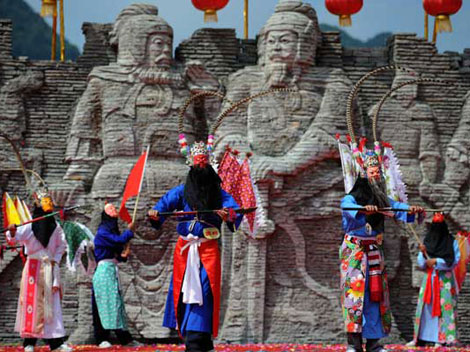Posted 2017/9/5
Di Opera is a traditional Chinese opera popularized in the Guizhou towns of Anshun, Huishui, Pingba and Zhenning. Originally without a name, the opera became known as Di because the audience watched on slopes rising in all directions from the stage.

It is said that the opera originates from sometime between 1368 and 1398 during the reign of Ming-Dynasty Emperor Hongwu, when the armed forces of north China entered Guizhou. History relates that the soldiers and commanders became homesick so they created this kind of opera to pass the time and reflect on their home towns. At a later date it spread to the places mentioned above.
Every theatrical troupe offers a special performances of a major piece of opera, including pieces on the subject of military affairs like the Army Commanders of the Yang Family. When performing, the artists cover their faces with black gauze before placing the masks on their forehead. They wear cloth shoes, unadorned cloth robes and hold 0.66-meter-long weapons. Their performance is full of enthusiasm and vibrates with long, loud, resonant voices.
Anshun is known as the home of Di Opera and its masks. Since the Ming Dynasty (1368-1644), uniquely skilled mask sculptors from various schools, (including the school of the Yang family), have come in large numbers to practice their art. The Yang family has lived for generations at Xiayuan Village in Anshun's Longgong Town and great skills and workmanship have been passed down for six generations. The exquisite masks produced by the Yang family are changeable and lifelike in design. In recent years, their products have been shipped and collected by art research institutes and museums in many countries and regions, including Britain, the United States, France, Germany, Japan and Taiwan. Sixth-generation Yang zhengkun performed mask carvings in Taiwan in 1993 and in 1995 was invited to Beijing's Semi-global Cultural Center to construct the World Primitive Totem Park. In his work he has created something new and has formed his own school following the traditional style.
Di Opera masks have become a tourist attraction and reflect much of the local style. You can buy the masks in large and small tourism markets in Guizhou. Those around the several thousand yuan mark would make valuable collector items.
.